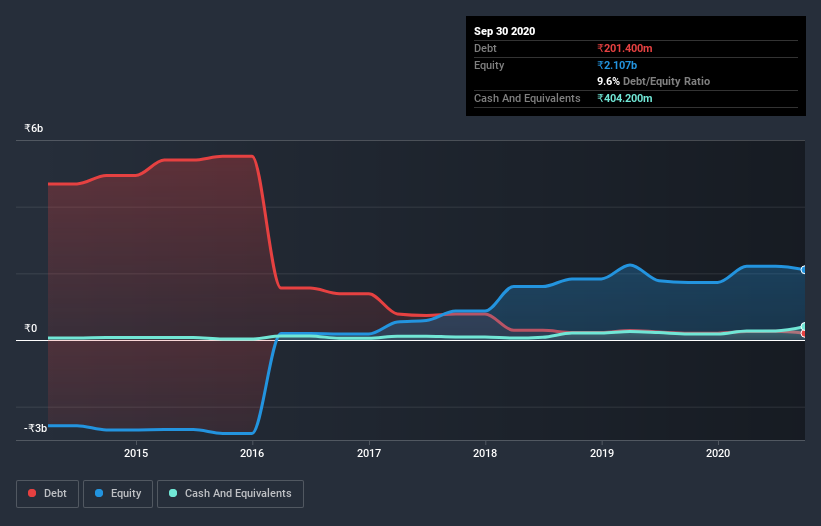
David Iben put it well when he said, 'Volatility is not a risk we care about. What we care about is avoiding the permanent loss of capital.' When we think about how risky a company is, we always like to look at its use of debt, since debt overload can lead to ruin. We can see that Ashima Limited (NSE:ASHIMASYN) does use debt in its business. But the real question is whether this debt is making the company risky.
When Is Debt Dangerous?
Debt is a tool to help businesses grow, but if a business is incapable of paying off its lenders, then it exists at their mercy. Ultimately, if the company can't fulfill its legal obligations to repay debt, shareholders could walk away with nothing. However, a more usual (but still expensive) situation is where a company must dilute shareholders at a cheap share price simply to get debt under control. By replacing dilution, though, debt can be an extremely good tool for businesses that need capital to invest in growth at high rates of return. When we think about a company's use of debt, we first look at cash and debt together.
See our latest analysis for Ashima
What Is Ashima's Debt?
As you can see below, Ashima had ₹193.9m of debt at September 2020, down from ₹205.0m a year prior. But on the other hand it also has ₹404.2m in cash, leading to a ₹210.3m net cash position.

How Healthy Is Ashima's Balance Sheet?
The latest balance sheet data shows that Ashima had liabilities of ₹448.8m due within a year, and liabilities of ₹209.0m falling due after that. On the other hand, it had cash of ₹404.2m and ₹341.1m worth of receivables due within a year. So it actually has ₹87.5m more liquid assets than total liabilities.
This short term liquidity is a sign that Ashima could probably pay off its debt with ease, as its balance sheet is far from stretched. Succinctly put, Ashima boasts net cash, so it's fair to say it does not have a heavy debt load! There's no doubt that we learn most about debt from the balance sheet. But it is Ashima's earnings that will influence how the balance sheet holds up in the future. So when considering debt, it's definitely worth looking at the earnings trend. Click here for an interactive snapshot.
In the last year Ashima had a loss before interest and tax, and actually shrunk its revenue by 22%, to ₹1.8b. To be frank that doesn't bode well.
So How Risky Is Ashima?
By their very nature companies that are losing money are more risky than those with a long history of profitability. And we do note that Ashima had an earnings before interest and tax (EBIT) loss, over the last year. And over the same period it saw negative free cash outflow of ₹48m and booked a ₹100m accounting loss. Given it only has net cash of ₹210.3m, the company may need to raise more capital if it doesn't reach break-even soon. Even though its balance sheet seems sufficiently liquid, debt always makes us a little nervous if a company doesn't produce free cash flow regularly. There's no doubt that we learn most about debt from the balance sheet. However, not all investment risk resides within the balance sheet - far from it. To that end, you should learn about the 3 warning signs we've spotted with Ashima (including 1 which doesn't sit too well with us) .
Of course, if you're the type of investor who prefers buying stocks without the burden of debt, then don't hesitate to discover our exclusive list of net cash growth stocks, today.
If you decide to trade Ashima, use the lowest-cost* platform that is rated #1 Overall by Barron’s, Interactive Brokers. Trade stocks, options, futures, forex, bonds and funds on 135 markets, all from a single integrated account. Promoted
New: Manage All Your Stock Portfolios in One Place
We've created the ultimate portfolio companion for stock investors, and it's free.
• Connect an unlimited number of Portfolios and see your total in one currency
• Be alerted to new Warning Signs or Risks via email or mobile
• Track the Fair Value of your stocks
This article by Simply Wall St is general in nature. It does not constitute a recommendation to buy or sell any stock, and does not take account of your objectives, or your financial situation. We aim to bring you long-term focused analysis driven by fundamental data. Note that our analysis may not factor in the latest price-sensitive company announcements or qualitative material. Simply Wall St has no position in any stocks mentioned.
*Interactive Brokers Rated Lowest Cost Broker by StockBrokers.com Annual Online Review 2020
Have feedback on this article? Concerned about the content? Get in touch with us directly. Alternatively, email editorial-team (at) simplywallst.com.
About NSEI:ASHIMASYN
Ashima
Manufactures and sells denim fabrics and readymade garments in India.
Proven track record with adequate balance sheet.
Similar Companies
Market Insights
Community Narratives



